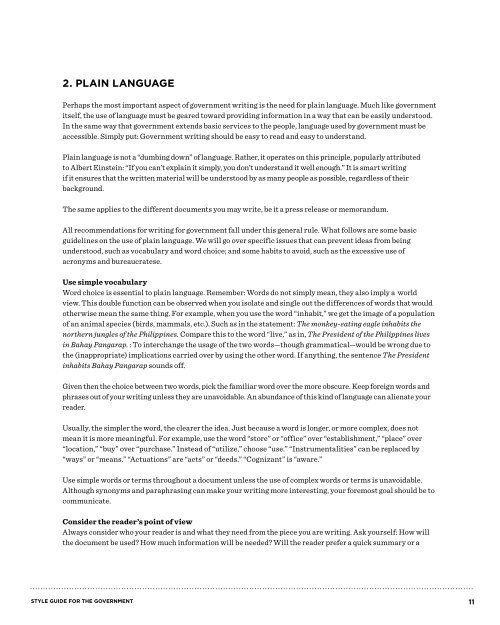You also want an ePaper? Increase the reach of your titles
YUMPU automatically turns print PDFs into web optimized ePapers that Google loves.
2. PLAIN LANGUAGE<br />
Perhaps the most important aspect of government writing is the need for plain language. Much like government<br />
itself, the use of language must be geared toward providing information in a way that can be easily understood.<br />
In the same way that government extends basic services to the people, language used by government must be<br />
accessible. Simply put: Government writing should be easy to read and easy to understand.<br />
Plain language is not a “dumbing down” of language. Rather, it operates on this principle, popularly attributed<br />
to Albert Einstein: “If you can’t explain it simply, you don’t understand it well enough.” It is smart writing<br />
if it ensures that the written material will be understood by as many people as possible, regardless of their<br />
background.<br />
The same applies to the different documents you may write, be it a press release or memorandum.<br />
All recommendations for writing for government fall under this general rule. What follows are some basic<br />
guidelines on the use of plain language. We will go over specific issues that can prevent ideas from being<br />
understood, such as vocabulary and word choice; and some habits to avoid, such as the excessive use of<br />
acronyms and bureaucratese.<br />
Use simple vocabulary<br />
Word choice is essential to plain language. Remember: Words do not simply mean, they also imply a world<br />
view. This double function can be observed when you isolate and single out the differences of words that would<br />
otherwise mean the same thing. For example, when you use the word “inhabit,” we get the image of a population<br />
of an animal species (birds, mammals, etc.). Such as in the statement: The monkey-eating eagle inhabits the<br />
northern jungles of the Philippines. Compare this to the word “live,” as in, The President of the Philippines lives<br />
in Bahay Pangarap. : To interchange the usage of the two words—though grammatical—would be wrong due to<br />
the (inappropriate) implications carried over by using the other word. If anything, the sentence The President<br />
inhabits Bahay Pangarap sounds off.<br />
Given then the choice between two words, pick the familiar word over the more obscure. Keep foreign words and<br />
phrases out of your writing unless they are unavoidable. An abundance of this kind of language can alienate your<br />
reader.<br />
Usually, the simpler the word, the clearer the idea. Just because a word is longer, or more complex, does not<br />
mean it is more meaningful. For example, use the word “store” or “office” over “establishment,” “place” over<br />
“location,” “buy” over “purchase.” Instead of “utilize,” choose “use.” “Instrumentalities” can be replaced by<br />
“ways” or “means.” “Actuations” are “acts” or “deeds.” “Cognizant” is “aware.”<br />
Use simple words or terms throughout a document unless the use of complex words or terms is unavoidable.<br />
Although synonyms and paraphrasing can make your writing more interesting, your foremost goal should be to<br />
communicate.<br />
Consider the reader’s point of view<br />
Always consider who your reader is and what they need from the piece you are writing. Ask yourself: How will<br />
the document be used? How much information will be needed? Will the reader prefer a quick summary or a<br />
STYLE GUIDE FOR <strong>THE</strong> <strong>GOVERNMENT</strong><br />
11


